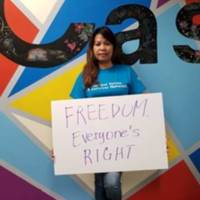
Abebi
There is an estimated 48,000 people living in modern slavery in Libya (GSI 2018). Libya is a major transit destination for migrants and refugees hoping to reach Europe by sea. Human trafficking networks have prospered amid lawlessness, created by the warring militias that have been fighting for control of territories since the toppling of Muammar Gaddafi in 2011. Highly organized trafficking and migrants smuggling networks that reach into Libya from Niger, Nigeria, Chad, Eritrea, Ethiopia, Somalia, Sudan, and other sub-Saharan states subject migrants to forced labor and forced prostitution through fraudulent recruitment, confiscation of identity and travel documents, withholding or non-payment of wages, debt bondage, and verbal, physical, and sexual abuse. In some cases, migrants reportedly pay smuggling fees to reach Tripoli, but once they cross the Libyan border they are sometimes abandoned in southern cities or the desert where they are susceptible to severe forms of abuse and human trafficking. Abebi*, a small business owner, was in need of more income after the death of her husband. She was targeted by a woman and told she could travel to Egypt to buy goods for her shop. Abebi paid the woman for a passport and ticket to Egypt, however she found herself in Libya where she was sold into domestic servitude.

Jayson De Guzman
There are an estimated 403,000 people living in conditions of modern slavery in the United States (GSI 2018). The US attracts migrants and refugees who are particularly at risk of vulnerability to human trafficking. Trafficking victims often responding to fraudulent offers of employment in the US migrate willingly and are subsequently subjected to conditions of involuntary servitude in industries such as forced labour and commercial sexual exploitation. Jayson De Guzman was working in construction in the Philippines when he came into contact with a woman who offered him work in the United States on a P-1 visa. Upon arrival in the US, Jayson was met by this same woman who took his passport and told him he owed her $12,000 and would have to work for her for 10 years to pay off his debt. De Guzman was forced to work in the same elderly care facility as Angela Guanzon who had been trafficked from the Philippines by the same recruiter. Jayson was forced to work seven days a week, twenty-four hours a day with breaks only for sleep. The majority of his salary was taken by the recruitment as ‘repayment’ for his debts. Jayson De Guzman was finally able to escape his situation when a neighbour of the facility noticed the workers were not getting any days off and called the FBI.

Angela (Narrative 2)
There are an estimated 403,000 people living in conditions of modern slavery in the United States (GSI 2018). The US attracts migrants and refugees who are particularly at risk of vulnerability to human trafficking. Trafficking victims often responding to fraudulent offers of employment in the US migrate willingly and are subsequently subjected to conditions of involuntary servitude in industries such as forced labour and commercial sexual exploitation. Angela Guanzon was facing the prospect of being forced into marriage or being jobless in the Philippines, leading her to seek out work abroad. She thought all her problems had been solved when she in 2005 was recruited for a health care job in California. However, upon arrival her trafficker demanded $12,000 for the ‘opportunity. Her passport was seized, and they threatened to call the police and tell them Angela had stolen something if she ran away. Guanzon was ordered to work for 10 years to pay off the debt at $300 a month. Angela was forced to work 18-hour days and sleep on the hallway floor of an elder care facility in Long Beach. Her exploitation finally ended after a neighbour noticed the signs of labour trafficking and contacted the FBI.

RH
There are an estimated 10,000 people living in modern slavery in Hong Kong (GSI 2018). Approximately 370,000 foreign domestic workers, primarily from Indonesia and the Philippines, work in Hong Kong; some become victims of forced labour in the private homes in which they are employed. An NGO report released in 2016 estimated as many as one in six foreign domestic workers is a victim of labour exploitation. Employment agencies often charge job placement fees in excess of legal limits, and sometimes withhold identity documents, which may lead to situations of debt bondage of workers in Hong Kong. The accumulated debts sometimes amount to a significant portion of the worker’s first year salary. Some employers or employment agencies illegally withhold passports, employment contracts, or other possessions until the debt is paid. Some workers are required to work up to 17 hours per day, experience verbal, sexual or physical abuse in the home, and/or are not granted a legally required weekly day off. RH, a 35-year-old woman from Ponorogo, described her living conditions at the training centre in Jakarta.

Putri
There are an estimated 10,000 people living in modern slavery in Hong Kong (GSI 2018). Approximately 370,000 foreign domestic workers, primarily from Indonesia and the Philippines, work in Hong Kong; some become victims of forced labour in the private homes in which they are employed. An NGO report released in 2016 estimated as many as one in six foreign domestic workers is a victim of labour exploitation. Employment agencies often charge job placement fees in excess of legal limits, and sometimes withhold identity documents, which may lead to situations of debt bondage of workers in Hong Kong. The accumulated debts sometimes amount to a significant portion of the worker’s first year salary. Some employers or employment agencies illegally withhold passports, employment contracts, or other possessions until the debt is paid. Some workers are required to work up to 17 hours per day, experience verbal, sexual or physical abuse in the home, and/or are not granted a legally required weekly day off. Putri was trafficked from Indonesia to Hong Kong into domestic slavery. She tells of her experience in a training centre.

IR
There are an estimated 10,000 people living in modern slavery in Hong Kong (GSI 2018). Approximately 370,000 foreign domestic workers, primarily from Indonesia and the Philippines, work in Hong Kong; some become victims of forced labour in the private homes in which they are employed. An NGO report released in 2016 estimated as many as one in six foreign domestic workers is a victim of labour exploitation. Employment agencies often charge job placement fees in excess of legal limits, and sometimes withhold identity documents, which may lead to situations of debt bondage of workers in Hong Kong. The accumulated debts sometimes amount to a significant portion of the worker’s first year salary. Some employers or employment agencies illegally withhold passports, employment contracts, or other possessions until the debt is paid. Some workers are required to work up to 17 hours per day, experience verbal, sexual or physical abuse in the home, and/or are not granted a legally required weekly day off. IR, a 29-year-old woman from Ponorogo (2009-2011), was trafficked to Hong Kong and deceived by her broker.

RM
There are an estimated 10,000 people living in modern slavery in Hong Kong (GSI 2018). Approximately 370,000 foreign domestic workers, primarily from Indonesia and the Philippines, work in Hong Kong; some become victims of forced labour in the private homes in which they are employed. An NGO report released in 2016 estimated as many as one in six foreign domestic workers is a victim of labour exploitation. Employment agencies often charge job placement fees in excess of legal limits, and sometimes withhold identity documents, which may lead to situations of debt bondage of workers in Hong Kong. The accumulated debts sometimes amount to a significant portion of the worker’s first year salary. Some employers or employment agencies illegally withhold passports, employment contracts, or other possessions until the debt is paid. Some workers are required to work up to 17 hours per day, experience verbal, sexual or physical abuse in the home, and/or are not granted a legally required weekly day off. RM, a 41-year-old woman from Ponorogo, was trafficked into domestic work in Hong Kong.

GM
There are an estimated 10,000 people living in modern slavery in Hong Kong (GSI 2018). Approximately 370,000 foreign domestic workers, primarily from Indonesia and the Philippines, work in Hong Kong; some become victims of forced labour in the private homes in which they are employed. An NGO report released in 2016 estimated as many as one in six foreign domestic workers is a victim of labour exploitation. Employment agencies often charge job placement fees in excess of legal limits, and sometimes withhold identity documents, which may lead to situations of debt bondage of workers in Hong Kong. The accumulated debts sometimes amount to a significant portion of the worker’s first year salary. Some employers or employment agencies illegally withhold passports, employment contracts, or other possessions until the debt is paid. Some workers are required to work up to 17 hours per day, experience verbal, sexual or physical abuse in the home, and/or are not granted a legally required weekly day off. GM, a 45-year-old woman from Banyuwangi, details her daily routine as a migrant domestic worker in Hong Kong.

GH
There are an estimated 10,000 people living in modern slavery in Hong Kong (GSI 2018). Approximately 370,000 foreign domestic workers, primarily from Indonesia and the Philippines, work in Hong Kong; some become victims of forced labour in the private homes in which they are employed. An NGO report released in 2016 estimated as many as one in six foreign domestic workers is a victim of labour exploitation. Employment agencies often charge job placement fees in excess of legal limits, and sometimes withhold identity documents, which may lead to situations of debt bondage of workers in Hong Kong. The accumulated debts sometimes amount to a significant portion of the worker’s first year salary. Some employers or employment agencies illegally withhold passports, employment contracts, or other possessions until the debt is paid. Some workers are required to work up to 17 hours per day, experience verbal, sexual or physical abuse in the home, and/or are not granted a legally required weekly day off. GH, a 29-year-old woman from Cilacap, Indonesia was trafficked to Hong Kong for domestic work.

DeWi
There are an estimated 10,000 people living in modern slavery in Hong Kong (GSI 2018). Approximately 370,000 foreign domestic workers, primarily from Indonesia and the Philippines, work in Hong Kong; some become victims of forced labour in the private homes in which they are employed. An NGO report released in 2016 estimated as many as one in six foreign domestic workers is a victim of labour exploitation. Employment agencies often charge job placement fees in excess of legal limits, and sometimes withhold identity documents, which may lead to situations of debt bondage of workers in Hong Kong. The accumulated debts sometimes amount to a significant portion of the worker’s first year salary. Some employers or employment agencies illegally withhold passports, employment contracts, or other possessions until the debt is paid. Some workers are required to work up to 17 hours per day, experience verbal, sexual or physical abuse in the home, and/or are not granted a legally required weekly day off. DeWi travelled to Hong Kong from Indonesia when an agency secured her domestic work in the country. Upon arrival her passport was taken and she was at the whim of the agency for finding work.

Luiza
There are an estimated 24,000 people living in modern slavery in Kyrgyzstan (GSI 2018). The country remains a source, transit and destination country for men, women and children subjected to forced labour and sex trafficking. Women from across the former Soviet Republic often travel to neighbouring countries with the promise of jobs as nannies, domestic workers, work in hotels and in the catering and entertainment sectors. However, upon arrival they find themselves sold to a pimp and forced in to sex work to pay off debt incurred for transportation, accommodation and the opportunity. Originally from Tashkent, Uzbekistan, Luiza Karimova* left her son with her family and travelled to Osh, Kyrgyzstan to find work. In Kyrgyzstan, she was sold into sex slavery and trafficked into Dubai. After 18 months, she was arrested and sent to jail. Today, Karimova works with Podruga, an organization based in Osh, Kyrgyzstan, which is supported by UN Women. Podruga works to end violence against women and assists women subjected to sex and drug trafficking.

Mo
There are an estimated 136,000 people living on conditions of modern slavery un the United Kingdom (Global Slavery Index 2018). According to the 2017 annual figures provided by the National Crime Agency, 5, 145 potential victims of modern slavery were referred through the National Referral Mechanism in 2017, of whom 2,454 were female, 2688 were male and 3 were transgender, with 41% of all referrals being children at the time of exploitation. People are subjected to slavery in the UK in the form of domestic servitude, labour exploitation, organ harvesting and sexual exploitation, with the largest number of potential victims originating from Albania, China, Vietnam and Nigeria. This data however does not consider the unknown numbers of victims that are not reported. Mo was living in Myanmar (Burma) when he was forced to leave after the persecution of Muslim people. He was staying in a refugee camp with his family which he describes as a ‘prison’. After running away he travelled by lorry to the UK. He was put in to a house and forced to work in a restaurant for little pay and no days off. Mo is now in a safe house, waiting for his passport and papers to be able to work.